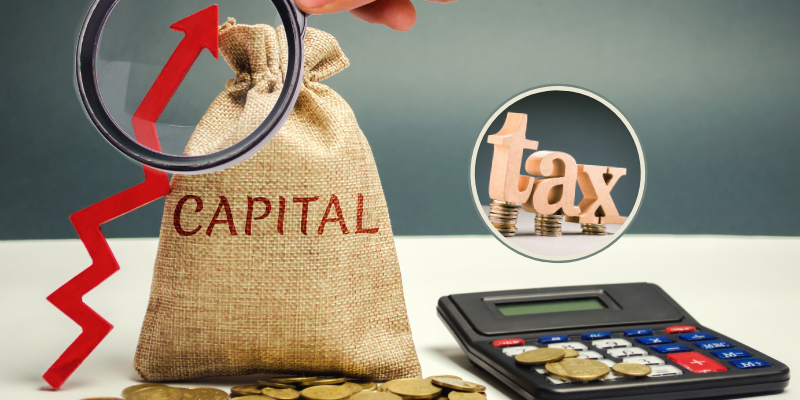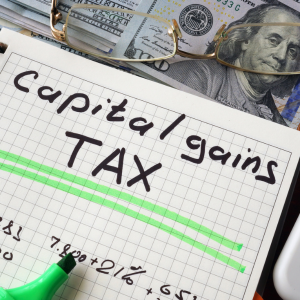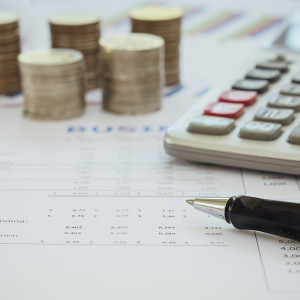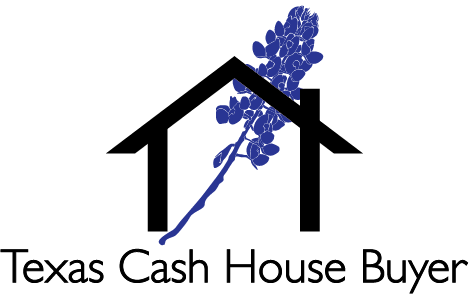
When you buy or sell a home in Irving, TX, you need to know about capital gains tax if you want to make smart money choices. The capital gains tax tool we offer makes it a lot easier to understand these complicated tax rules. You can still follow the rules and keep more of your money. Knowing your tax obligations ahead of time can save you a lot of money when you sell your house, get money out of stocks, or get rid of other valuable items. If you use our calculator, you can get a full analysis, personalized views, and useful tips on how to pay the least amount of taxes in the Irving market, which is always changing.
Key Highlights
- An advanced tax calculator can help you readily grasp Irving’s capital gains tax regime.
- Find out how short-term and long-term capital gains effect your taxes and the investments you make.
- Offsetting gains with losses is a good way to keep your taxable income low and your tax strategy strong.
- Keep an eye on any changes to tax rates so you can make wiser financial choices.
- Use credits and deductions to lower the amount of taxes you owe.
Things You Should Know About Capital Gains Tax in Irving, Texas
To build a successful tax plan, those who live in Irving, TX need to know how capital gains taxes work. A capital gain is when you sell something, such real estate, stocks, or other investments, for more than you paid for it. Your gain is the difference between what you paid for it and what you sold it for. That’s what gets taxed.
The most crucial thing to keep in mind is the difference between gains that happen quickly and those that happen over time. The length of time you’ve owned the asset is the main factor in how much tax you pay. If you know a lot about these groups, you’ll be able to plan ahead, arrange your sales better, and keep more of what you make. With some planning and the right tools, you may minimize your capital gains tax and enhance your overall financial status.
What “capital” and “gains” mean when you invest

“Capital” is merely the money you put into an asset, such a stock, a piece of real estate, or a business. The difference between what you paid for an asset and what you sell it for is called a “gain.”
To find out how much profit you made, you need to know your cost basis, which is the whole of what you paid plus any other charges that came up, such fees or improvements. To figure out how much you made (or lost) when you sold, take the selling price and subtract your cost basis.
This is really significant for people who invest in Irving. Your tax bill will be affected by these values. Also, not all earnings are treated the same:
- Regular income tax rates, which are normally higher, apply to short-term gains (assets held for less than a year).
- Long-term profits (assets kept for more than a year) generally pay reduced taxes.
- That difference can be extremely substantial.
You can achieve long-term status and save a lot on taxes if you sell at the proper moment. The first step to making better investments and arranging your taxes better is to learn these rules.
How to Tell the Difference Between Capital Gains That Are Short-Term and Long-Term
The main difference between short-term and long-term capital gains is how long you keep the asset until you sell it.
If you sell within a year, your profit is a short-term gain and is taxed at your regular income tax rate, which may be as high as 37% for people who make a lot of money. For a lot of individuals in Irving, that means a lot less money.
If you hold the item for longer than a year, your profit becomes a long-term gain and you can earn lower rates, normally between 0% and 20%, depending on how much taxable income you have.
This distinction might mean a lot for people who own homes. You could make a lot of money if you sell a house that has gone up in value, but knowing when your sale counts as long-term and when to sell can help you pay less in taxes.
Savvy investor home buyers in Texas often strategically time their property sales, turning short-term investments into long-term gains whenever possible. This approach helps maximize after-tax profits and steadily grow their real estate portfolios over time.
How to Find Out How Much You Owe in Capital Gains Tax
It might seem hard to figure out capital gains taxes at first, but it’s much easier once you get the hang of it. The most important steps are to figure out your gain or loss, know which tax rates apply, and think about how long you’ve owned the asset.
If you know the basics, you can figure out how much you owe in taxes ahead of time, plan how to pay it, and even lower what you owe by timing your investments well.
How to correctly figure out capital gains
- Your cost base is the total amount you spent on the property, including the purchase price, closing costs, and any repairs you did.
- Find the sale price, which is the total amount you got for selling the asset.
- The difference between the sale price and the cost basis is your capital gain (or loss).
- It’s short-term if you hold the gain for less than a year. It’s long-term if you keep it for more than a year.
- Use the right tax rate based on how much money you make and what kind of business you have.
Using a capital gains tax calculator will help make this process easier and more accurate. A calculator designed specifically for Irving takes into consideration state and city peculiarities to give you a clearer understanding of how much you owe and how to prepare.
Also, you should look at your resume every once in a while. If you keep track of your assets and plan your trades carefully, you can turn likely short-term profits into long-term ones. You’ll pay less in taxes, which will help your money in the long run.
Calculating Capital Gains and Losses: Some Examples
Here are a few simple examples:
- You got shares for $10,000 and sold it two years later for $15,000, for example. The $5,000 you made constitutes a long-term capital gain, which is taxed at a reduced rate.
- You got another stock for $8,000 and sold it eight months later for $12,000. The $4,000 profit is a short-term gain that is taxed at your standard income tax rate.
- You bought something for $5,000 but sold it for $3,000, which implies you lost $2,000. That loss can wipe out other gains, which decreases your overall taxable income.
These examples demonstrate why it’s crucial to know how capital gains are classified. Even little differences in the schedule can save you a lot of money on taxes. You can be confident that your estimates are correct and that your plans fit with your overall financial goals by using tax calculators and other resources to help you with this calculation.
Ways to Cut Your Capital Gains Tax
If you want to pay less capital gains tax, it’s not about avoiding taxes; it’s about smart, legal planning. You may keep more of your investment income and minimize your taxable gains by using the right strategies.
Some of these strategies include employing tax credits, deductions, and capital losses to make up for earnings. By using these tips and planning ahead, people who live in Irving can save a lot of money on their taxes every year.
Using deductions and tax credits

Tax credits and deductions are two great ways to lower the amount of taxes you have to pay. Deductions lower the amount of money you have to pay taxes on, while credits lower the amount of taxes you owe.
This could mean that investors put money into projects that can get tax breaks, like programs for renewable energy or community development. These not only make money, but they also help you save money on taxes.
People who own homes in Irving can also get tax breaks for making changes to their homes, especially ones that make them use less energy. Also, deductions for business or school expenses can lower your tax rate, which can lower the rate on your capital gains.
A personalized capital gains calculator can help you determine which credits and deductions you may qualify for, ensuring you get the most out of your tax strategy. Whether you’re managing investments or planning to sell your house fast in Irving, consistency is key. By regularly reviewing your financial plan and staying informed about new tax breaks, you can keep your strategy current and effective year after year.
How losses in capital can cancel out gains
When it comes to keeping your taxes low, capital losses can be very helpful. If you sell an investment for less than what you paid for it, you can use the loss to lower the gains you make on other assets.
If you made $10,000 on one stock and lost $4,000 on another, you would only have to pay taxes on the $6,000 net gain. You can also carry the rest of your losses forward to future tax years if your overall losses are greater than your gains.
Tax-loss harvesting is a way for investors to smooth out changes in their income and pay less in taxes over time. It’s especially helpful in markets that are unstable, when some assets may go down while others do well.
Irving investors can keep their overall wealth by selling investments that aren’t doing well at the proper moment to offset taxed gains. One of the easiest and best methods to keep tax-efficient is to look at your portfolio on a regular basis with this in mind.
How Tax Rates Affect Capital Gains
The amount of money you keep from your investment profit is directly affected by your tax rate. Understanding both current and projected future tax rates helps you determine when to sell assets and how to organize your investments for optimal efficiency.
Looking at the current tax rates on investments
Right now, U.S. tax law has different rates for short-term and long-term capital gains. Short-term gains are taxed like normal income, which means the rates might be anywhere from 10% to 37% of your total income.
Long-term capital gains, on the other hand, get lower rates, usually 0%, 15%, or 20%. The 15% rate applies to most middle-class investors.
These brackets assist Irving investors in making decisions. If your income is getting close to a higher tax band, for example, it can be a good idea to wait until a year when your income is lower to sell an item that has gone up in value. This will lower your tax rate.
It is also vital to keep an eye on changes in the law. Sometimes, lawmakers suggest changes to the way capital gains taxes are set up, which can affect both timing and profits. Keeping up with the news makes sure that your plan is still in line with the current tax situation.
Predicting Changes in Tax Rates in the Future

Tax regulations are always changing, and these changes can have a huge effect on how much money you gain from your assets. Over time, tax rates alter because of economic advancements, political priorities, and government budgetary policies.
Smart investors keep an eye on these changes and make changes as appropriate. For example, you might choose to sell some assets sooner to lock in existing rates if higher capital gains taxes are coming ahead. If cuts are imminent, it might be preferable for you to wait to sell.
It also helps to look at things from a global point of view. Changes in trade restrictions or worldwide markets could affect tax laws in the US, especially for persons who have a number of various investments. Advanced tax calculators and other tools can help you figure out “what-if” situations and estimate how possible rate changes might affect your bottom line.
By identifying these possibilities and making arrangements based on them, people in Irving may secure their financial plans for the future and keep progressing gradually toward long-term progress.
Combining Capital Strategies with Income Tax Issues
Your financial plan will be more complete and effective if you combine your income tax preparation with your capital gains approach. Aligning both forms of taxes helps sure you don’t pay too much or miss out on significant chances because they both impact your total income.
Finding the correct balance between income tax and capital gains tax
If you manage your income and capital gains jointly, you can keep more money after taxes. Your income tax rate applies to short-term profits, so if you time your investments to happen while your income is lower, you can save a lot of money.
Long-term profits, on the other hand, provide you time to get ready. If you hold on to your assets longer and spread out your transactions, you can keep your income constant for a few years and stay in lower tax brackets.
People who own homes or businesses in Irving can cut their taxes even more by claiming deductions for home upgrades, business expenses, or renewable energy credits. A financial advisor who knows the local tax regulations can help you identify opportunities that are right for you.
A good tax calculator also allows you to explore different scenarios — such as adjusting sale dates or factoring in deductions — to see how they affect the taxes you owe. By using these strategies regularly, you can keep your current income taxes in check and ensure that your long-term capital gains stay balanced, helping your portfolio grow in a healthy, sustainable way. And if selling a property is part of your financial strategy, Texas Cash House Buyer buys houses for cash in any condition, making it easy to free up funds quickly — contact us today to learn more.
FAQs
What is a capital gains tax, and why is it important for those who live in Irving, Texas?
You have to pay capital gains tax on the money you make when you sell something, such property, stocks, or other investments. People in Irving can plan better, keep out of trouble, and get the most out of their investments if they know it.
How are short-term and long-term capital gains taxed differently?
If you have assets for less than a year, you pay more taxes on short-term gains than you do on ordinary income. Long-term gains (those held for more than a year) are taxed at lower rates, usually between 0% and 20%.
What can I do to pay less in capital gains tax?
You can lower your taxes by taking deductions, credits, and losses. You may also use things like capital gains tax calculators to help you choose the optimal time to sell so that you don’t have to pay as much in taxes.
Can you utilize losses on capital to cancel out profits on capital?
Yes. If you lose money on investments, you can use those losses to lessen your profits, which lowers the amount you owe in taxes. If your losses are bigger than your earnings, you can carry them over to the next tax year.
Why should residents in Irving, Texas use a particular calculator for capital gains tax?
A calculator created exclusively for people in Irving gives you actual numbers based on where you live. This can help you figure out how much money you might owe and make better financial decisions.

